By James Borrowdale and Joe Hockley
Many people know the siren scene as the place that birthed Jawsh 685, or from hearing the music blasted through speakers mounted on bicycles and cars. But as journalist James Borrowdale and photographer Joe Hockley found, the love of loud music is about community, crossing gang lines to keep its enthusiasts away from the orbit of crime.
This article accompanies a 20-minute documentary on the siren scene which you can watch now on the Re: YouTube.
Auckland’s siren scene was out to honour the memory of one of its original lights.
Dom Masoe, the founder of the Notorious Familia crew, had recently died, and at least a dozen portraits of him—aloft over the crowd, held out of car windows—were reminders of the sombre reason for this gathering. But there was celebration, too.
The crowd pressed around Duuinonz—a 19-year-old from Glen Innes—as he started to speak. A patch of grey on his close-cropped facial hair gave him the look of a man much older.
“Look at us now, this is pretty wicked,” he said, motioning at the crowd. “For [Dom] to bring us all together, it means something. It doesn’t matter what hood you are from, what colour you bang, we’re all family in this scene… We are family up in here, and that’s what this scene is about. It’s about the love of sounds.”
When he finished, he asked if anyone would say a prayer, and the figurative mic was passed to another member of the crowd.
After amen, a minute of silence descended—its stillness more pregnant with meaning for settling over a couple of hundred people gathered to play, and listen to, music as loud as it was possible to make it.
Watch the full 20-minute documentary here: Auckland’s underground street music scene: cars, loud speakers and late-night sound battles.
“Islanders do love music,” Duuinonz told Re: a few weeks after the battle, sitting on the quiet street outside his home. “And if it’s loud music, we’re all there.”
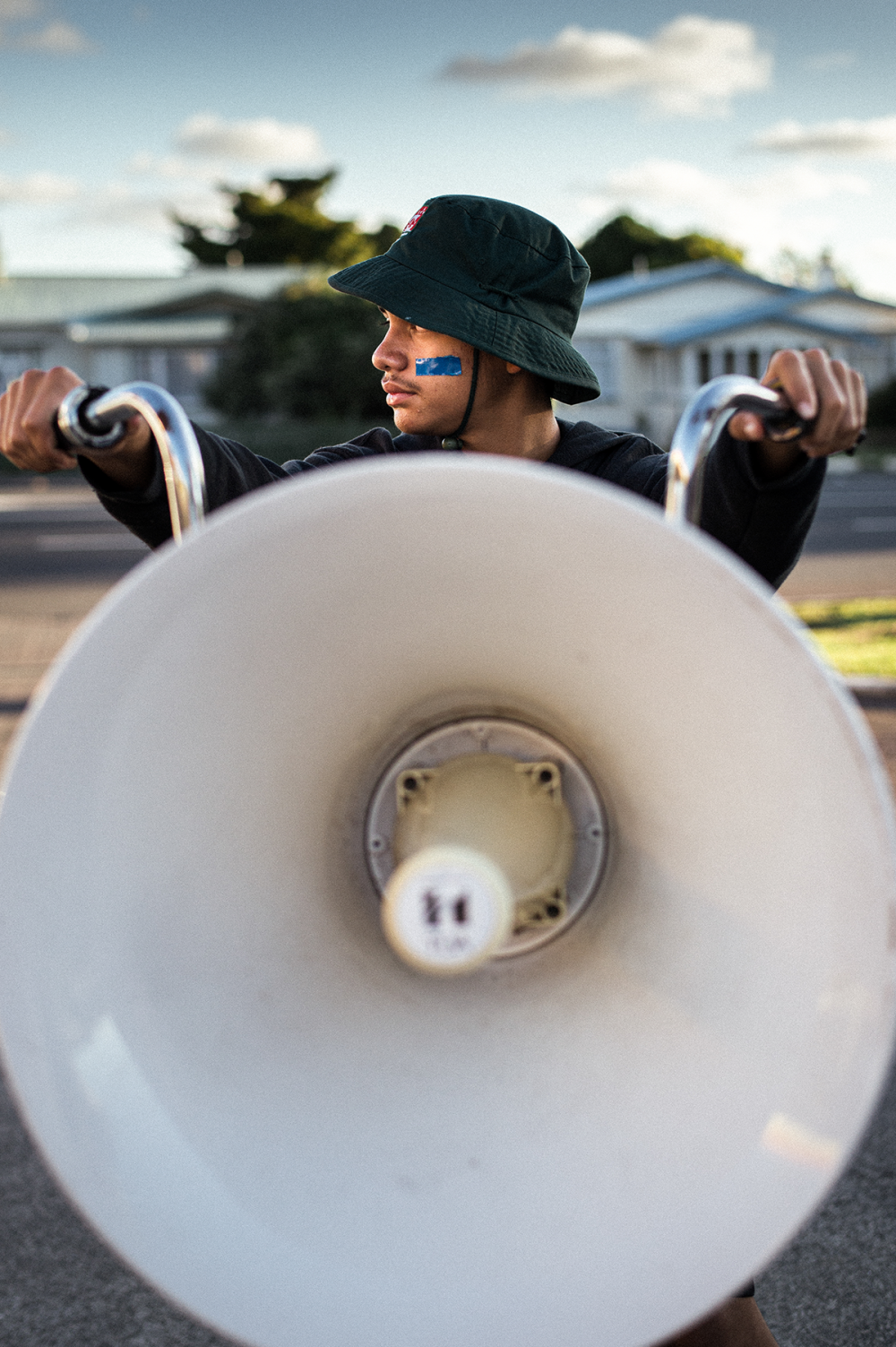
A member of the Noizy Boyz crew in Onehunga. Photo: Joe Hockley
The siren scene, he said, was 95 percent Polynesian—and then reiterated what he had said on the night: that family and communality were the scene’s priorities.
Years ago, when he first got involved in the scene, perhaps only 30 people would turn up to a battle, instead of the hundreds on the night Duuinonz spoke.
“I mean, bro, it’s a good feeling knowing you are part of something big now, and you’re part of it because you’ve been doing it for so many years now.”
And, he emphasised, it was that instinct for coming together that fuelled the growth.
“All Polys, the way Polys have grown up, family is number one, especially [with] church, so bringing everyone together as one is always our main goal.”
“Us Polys,” a member of the Noizy Boyz told me on the evening of the battle, “we love our music. And we feel the only way we can show our love for our music is to let the whole world know, you know—play our music, that’s what we love. It may be annoying, people thinking, these guys driving around the neighbourhood being dickheads, but that’s not our mindset.”
Near the entrance of the car park, a police paddy wagon was parked up—a vague threat ignored by the swirl of cars and people.
It was to be a big night for the Noizy Boyz. That afternoon, members of the small crew, whose members mostly hail from Onehunga and Mangere—that patch of Tamaki Mākaurau dissected by the southern motorway—gathered on the long driveway of the crew’s founder and former leader, Noneh Tatafu, 30.
Noneh would be leaving Onehunga, and New Zealand, for Melbourne the following day; the night would be his farewell from the scene, and from the suburb he had lived in for 30 years. The current leader of the crew, Soni Taufa, 19, would take his Toyota Vitz into battle that night.
The afternoon was spent in congress over the hood of the humble hatchback, attaching three big sirens, dotted along a scrappy piece of off-cut wood, to the bonnet, and wiring them up. They would augment the smaller sirens permanently wedged into apertures in the bumper.
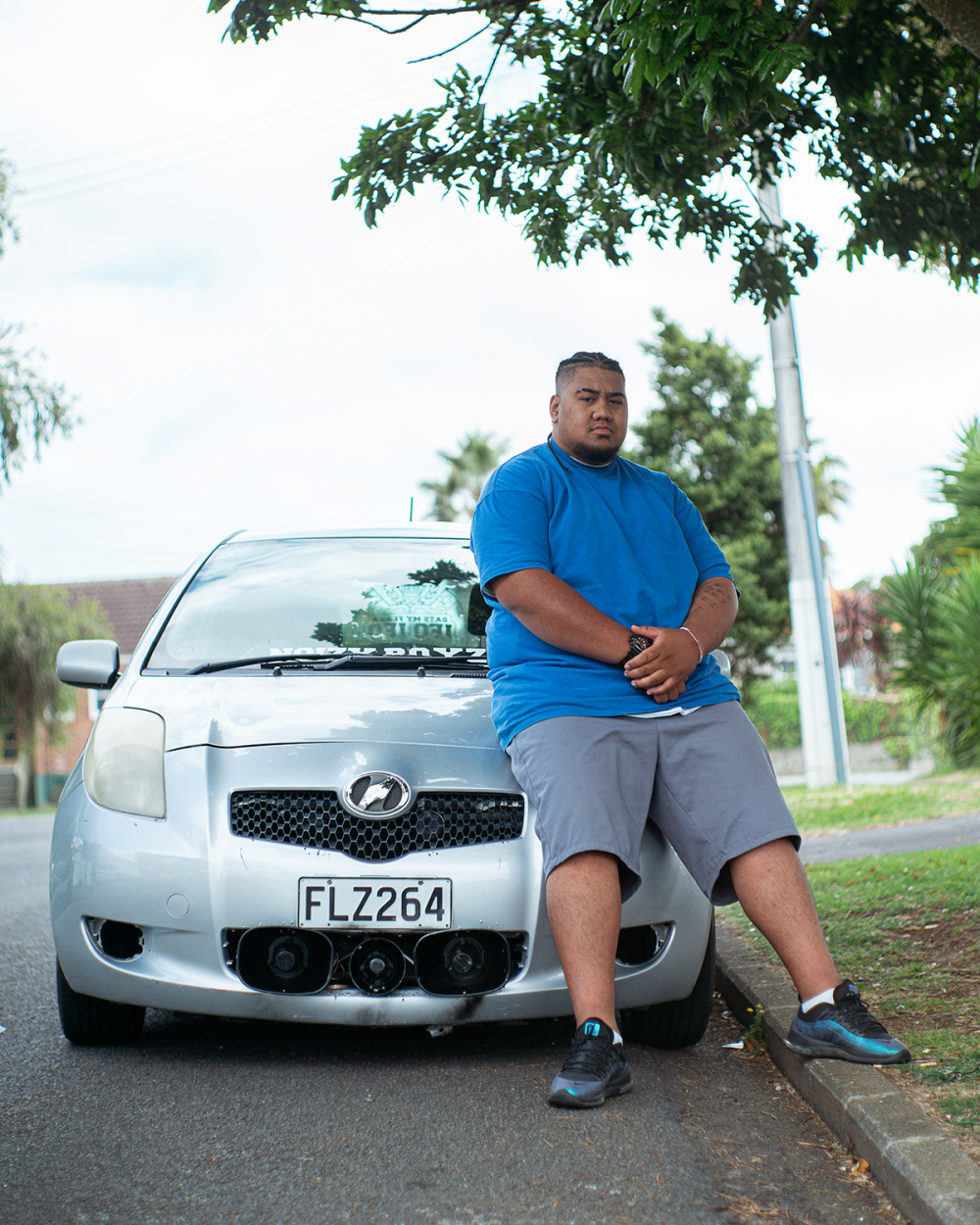
The end product: Noizy Boyz leader Soni with his Toyota Vitz. Photo: Joe Hockley
Not everyone’s a siren fan
The passion for loud music pumped through sirens is not, of course, shared by all. In 2016, for example, Onehunga police were receiving up to 20 noise complaints each week related to the siren scene, and had compiled, according to Stuff, a list of 22 vehicles “being used to blast music around the Onehunga foreshore”—many of which, the article said, were associated with the Crips gang.
Another Stuff piece included a claim from an unnamed “industry insider” that 90 percent of the sirens for sale or trade on one Facebook page appeared to be stolen. Onehunga Community Constable Don Allan told Stuff that it wasn’t “just guys having a bit of fun on their bikes, it’s people involved in criminal activities as well”.
The Noizy Boyz, though, saw what they did in the exact opposite light. Noneh, it’s true, has as a long association with the Crips—the blue Converse hightops he wore a nod to the colours of that gang—but the siren crew he had founded did not.
Noneh had first started mucking around with sirens in 2006 but it wasn’t until 2015, four or five years after the first Auckland battles were held, that he founded the Noizy Boyz. Soon after he won the title of Siren King—the accolade given to the loudest vehicle—in the Ford Explorer he had since sold when the cost of its repairs became too great.
One day, he remembered, 10 or so cops raided his home to recover what they thought were stolen sirens. “They came in with their warrant and stuff, and looked in my room and garage, saw like a whole stack of sirens.” Noneh just smiled, and handed the sergeant a stack of receipts, saying “Can you have a read of this?”
The sergeant’s eyes flicked from the paper in his hands to the sirens and back again, and then to his colleagues. “He was like, ‘Ah, these are not stolen.’ I was standing there and I was laughing. I was like, ‘Do your research!’” Most members of the scene, he said, carried their receipts in the dashboards of their cars, in case of similar confrontations.
It’s about more than gangs
For there was no criminal element to the Noizy Boyz—and Noneh had made the conscious decision, when getting the crew off the ground, to keep the “gang stuff” out of it.
He wanted to transcend the limitations of that imported Bloods vs Crips rivalry—“brothers before colours” as a young member of the crew said. Some of the original members, like Noneh, were blue; others were red. To work as he wanted it to—to be about nothing more than the love of music, and gathering to celebrate it, to be a respite from the usual pressures of life—the Noizy Boyz needed to rise above that distinction. “We had to bond, you know,” Noneh said.
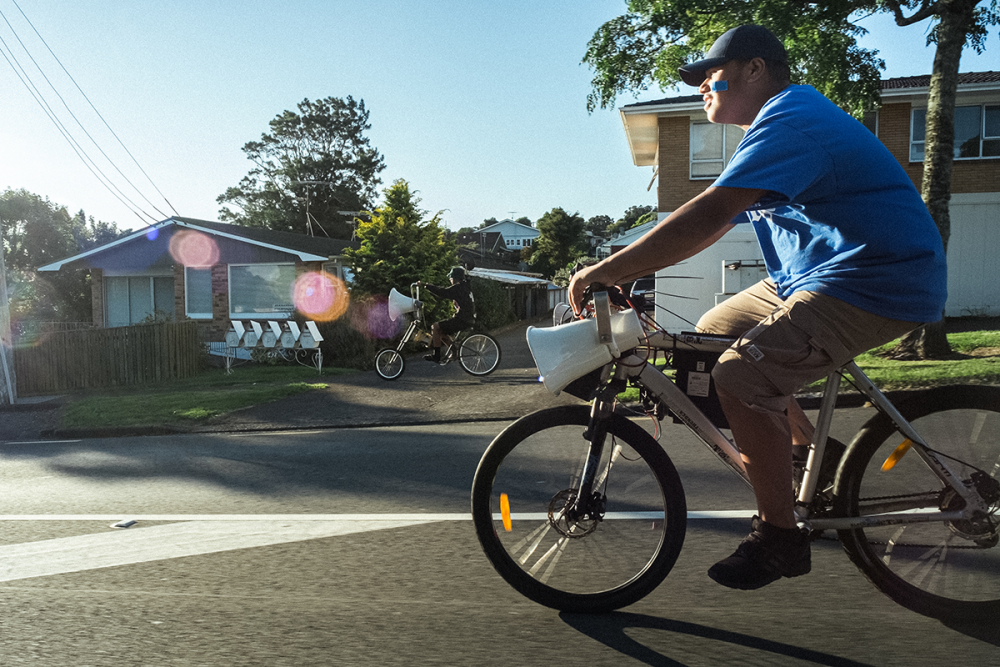
Noneh’s younger brother Onap in Onehunga. Photo: Joe Hockley
It’s a philosophy that is still with the crew, half a decade later. When Soni took over the leadership, it was something he emphasised. “One thing I did when I became leader was—cos we got people who rep blue and red, two different colours—I told them, ‘Drop the colours, we’re all one team.’ I didn’t want that eh.”
His deputy, Jay Taala, 21, explained how life had led him to a similar realisation. After a childhood spent bouncing between Samoa, where he was born, New Zealand and Australia, in 2017 his father sent him back to Samoa for “being too naughty”—getting into trouble, smoking lots of weed. Eventually he realised those weren’t the things he wanted.
“Just learnt from there that wasn’t the life I wanted, you know, I didn’t want to be affiliated in gang activities.” Now a stay-at-home father, he was firm in that conviction: “I’m not really gang dude, eh. I don’t like going out every Friday, Saturday beating up dudes and shit eh—just not me.”
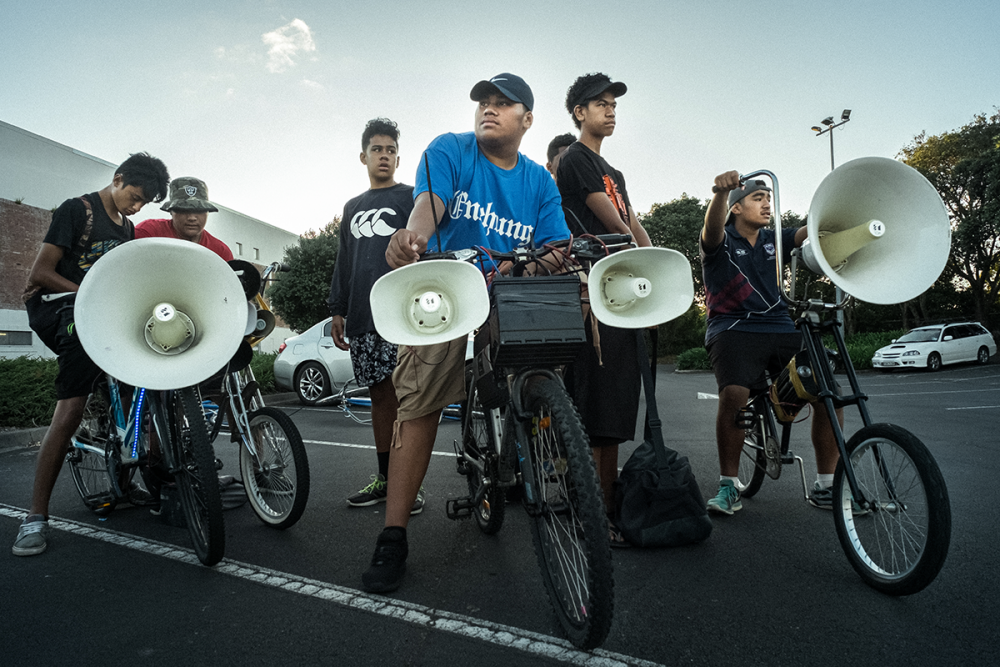
Noizy Boyz crew set up for a battle in Mt Roskill, with Noneh’s younger brother Onap in the middle. Photo: Joe Hockley
He said that Noneh, in originally accepting members from both sides of the divide, had been “very humble”. “A lot of gangs out here—you got the Crips, the Bloods—and as a Crip dude, accepting all those Bloods dudes, that’s real humble.”
Noneh, he said, had grown up immersed in gang life and that was all he had known. But as Noneh had grown up, Jay thought, he had realised there was another path he could’ve taken, and his legacy had shown the younger generation—like Soni, like Jay—how they themselves could take it. Those two leaders were now passing their lessons on to younger members.
For Soni, leadership was about “more than just the scene in itself”.
“It’s outside the siren battles as well, making sure the boys are okay, making sure they are safe and stuff, making sure no one is going through anything.”
Jay cited the example of a young member of the crew who had been veering close to gang life: “not just those little street gangs but the big, patchy gangs”.
“I just felt like it was my purpose to try and take him out of that life instead of making him just a statistic, you know actually help him be something. Live longer, to actually look after his parents and all. So yo, when he joined the team, all that gang shit that was in his mindset, gone. He was all about the sounds.”
What the police say
Far from consisting for the most part of “people involved in criminal activities” as Constable Allan said in 2016, the Noizy Boyz—and the wider scene—actually keeps its enthusiasts out of criminality and away from the orbit of gangs, Noneh said.
“It keeps the boys out of trouble… if you are in a gang, you do gang stuff. You get up to mischief and stuff. But with the Noizy Boyz, with the siren crew, that’s a whole different game. We just do like, you know, go out play pool and stuff like that, catch up over a feed, hook up sirens, go for a cruise. That’s how we stay positive eh.”
It is, perhaps, a realisation the police have latterly come to. In a statement supplied to Re: Constable Allan said the siren scene was “no longer an issue of concern for Maungakiekie residents and has not been since 2016”.
Police, he said, had worked closely with the community to “ensure information about these incidents were passed on so we could identify and speak to those responsible… Those responsible were compliant and the issue was resolved.”
Since then, he said, there had only been a single complaint to the police. “We believe it was an isolated event.”
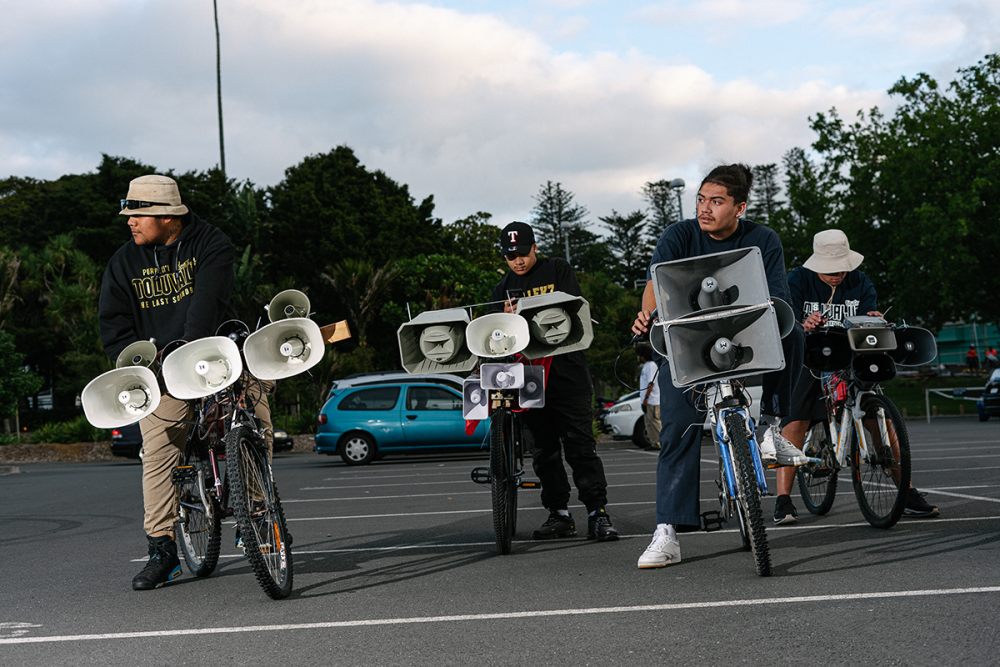
2021: Sireners line up at Mangere Centre Park for a battle in honour of Dom Masoe - one of the founders of the Auckland scene who had recently died. Photo: Joe Hockley
The big ‘battle’ night
The blue and red of the police lights grew brighter against the dying sunlight. Three or four officers walked around in a group, pausing to talk with participants. There were still hours to go before 10pm, when the council’s noise-control officers would be authorised to act. The cops left without incident, and the evening commenced.
“Battle” almost seems the wrong word for the passivity of what actually occurs. Soni’s Vitz, from behind, wouldn’t have looked out of place clogging the roads outside a school come 3pm pick-up time. But from the front, with those three white sirens glowing in the dusk, it looked post-apocalyptic, like something from Mad Max.
Behind the wheel, Soni was faintly illuminated by the light of his phone, from which he played tunes. His opponent, a member of the Straight Original Riders, in a grey Toyota station wagon sat a couple of metres away, a similarly vague outline behind the windshield; a judge—member of a neutral crew—stood ten metres in front of the cars.
There are plans to approach the council, Duuinonz told Re:, in the hopes of finding a sanctioned venue in which to hold these battles. “Where could we possibly battle? Just give us a set of rules and times, and times we’re allowed to be there—you know, what youse guys want from us, what you guys expect from us and we’ll go from there.”
The point of what they do, he was at pains to emphasise, is not to annoy people and, while there will always be those who disregard any rules laid down by the leaders and “switch on” in suburban streets at 3am, most, Duuinonz said, had matured as the scene had also—as that dramatic reduction in Onehunga complaints also suggests.
Soni didn’t win, that night. The first two rounds, during which competitors each take a turn to demonstrate the loudness and clarity of their sounds, were shared one each. That meant a third: the drownout. A cacophony was launched as both systems simultaneously blasted sounds into the night. When the noise had died away, the judged motioned in the direction of Soni’s competitor. Both cars quietly drove away.
It is competitive—but ultimately, Soni told Re:, it’s just about fun. “The vibes we have, we take into battles. [It’s about] fun and games… That’s the spirit we want at battles.”
It was dark now; fireworks burst in the sky overhead. The police returned, their presence predictably welcomed by KRS-One’s “Sound of da Police”, but the only possible infraction, once the battles were over, seemed to be the occasional Smirnoff RTD held discreetly behind open car doors.
The sense, overwhelmingly, was of hobbyists out enjoying what they do. “Give a kid a bike, a battery, a head deck and an amp,” Jay had said earlier. “Shit, look what he can do.” Gathering to watch those kids in action, had brought hundreds of people peacefully—if not quietly—together.
Jay again: “The main reason us Polys go down, we’re fighting each other—for what? There’s nothing to fight about, we’re all the same people. That’s why I like the siren scene. It brings us Polys together.”
Words: James Borrowdale
Images: Joe Hockley
Made with the help of NZ on Air.
Watch the short documentary Young and a Siren King here on the Re: YouTube channel.
Young And is a series of documentaries that look at what it’s really like to be in your 20s in Aotearoa. From the stories of young people who lived on Auckland’s streets as teens to women who struggle to orgasm, we take an honest look at issues around sexuality, culture, gender and social identity.
Watch the other Young And documentaries at TVNZ OnDemand here.
More stories: